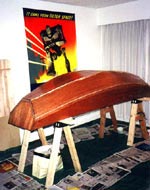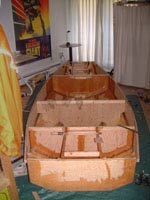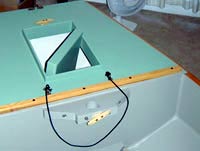|
Editors
note: of this article, Mr. Waters wrote:
"Your current contest prompted the attached...."
which prompts us to advise our readers that said
contest is nearing it's deadline. We urge everyone
interested to enter the contest before it's too
late.
Click HERE
for more info. |
|
A few winters back saw me
working away from home, living in a one room rented apartment.
Perhaps it was cabin fever, but I decided to build a boat. I'd
been reading Dynamite Payson's "Build
the New Instant Boats"; Bolger's Nymph looked ideal -
all those curves from sheet goods. Living on the ground floor
meant that I could avoid any tiresome block and tackle work. Some
quick measurement confirmed that the patio sliding door would
open far enough to permit a finished boat to pass through on its
side.
A Plan Takes shape.
Plywood could be cut into panels
in the parking garage of the building where I was working and
smuggled into the apartment at night, passing in via the same
patio door through which the finished hull would later emerge.
Epoxy and glass were obtained, the furniture (rudimentary in any
case) was pushed back against the walls, and the carpeted floor
was covered in a sandwich of polytarp and newsprint. A couple
of sawhorses were knocked together and construction began.
 Since this was my first attempt at building a
full sized boat it would be an exaggeration to say that everything
went smoothly. After trailing a few sleeves in wet goop I realised
that a system was needed. Carefully blended hardener gave epoxy
which could be applied first thing in the morning by a semi-naked
builder with a reasonable expectation of having it set up by the
same evening. Accidental skin contact could be remedied with vinegar
prior to the morning shower. (You may be glad to learn that there
are no photographs of this part of the building operation). Leaving
the extractor fan on was enough to clear the air in the apartment
by evening. Gradually a boat began to appear from the growing
pile of sawdust, shavings and used mixing cups. Since this was my first attempt at building a
full sized boat it would be an exaggeration to say that everything
went smoothly. After trailing a few sleeves in wet goop I realised
that a system was needed. Carefully blended hardener gave epoxy
which could be applied first thing in the morning by a semi-naked
builder with a reasonable expectation of having it set up by the
same evening. Accidental skin contact could be remedied with vinegar
prior to the morning shower. (You may be glad to learn that there
are no photographs of this part of the building operation). Leaving
the extractor fan on was enough to clear the air in the apartment
by evening. Gradually a boat began to appear from the growing
pile of sawdust, shavings and used mixing cups.
The Manager calls.
Winter in Vancouver isn't really cold the way, say, a prairie
winter is cold. It does get too cold to set epoxy outdoors. It
also gets cold enough that if the heating in one's apartment fails
one tends to notice, so when I stuck my nose out from under the
covers one morning I could tell that there would be no epoxy work
done that day.
 By
now the hull was taped, the exterior was glassed and gunwales
had been fitted. A day later, the heat had still not come back
on and I called the building manager from work to ask when heat
was due to be restored. "The heating should be working fine"
came the surprised reply, "I'll need to check in your apartment". By
now the hull was taped, the exterior was glassed and gunwales
had been fitted. A day later, the heat had still not come back
on and I called the building manager from work to ask when heat
was due to be restored. "The heating should be working fine"
came the surprised reply, "I'll need to check in your apartment".
Oh-oh.
'Lunch Hour' that day was spent in a frenzy of cleaning, tidying
and vacuuming. At the end of the process I had three big black
garbage bags stuffed full of glass and epoxy debris, shavings
and sanding scrap - all the detritus of a little bedroom boatyard.
The tarps were folded and packed, the sawhorses knocked down and
stowed away. All that was left was a large and obviously boat
shaped object in the middle of the carpet. Only one thing for
it. I can confirm from practical experience that a complete Bolger
Nymph can be squeezed into an improbably small walk-in closet.
Stored standing on its transom , those athwartships bulkheads
can be used as shelves. One can in fact stand in front of the
closet door looking slightly guilty without an apartment manager
appearing to notice.
A sharp rap from the building manager's screwdriver loosened some
vital component in the heating system and warmth began to return
to the room. Perhaps that was what caused the slight flush in
my cheeks. Time to roll out the tarps again.
 A month later the Nymph was finished; Thwart
and partner installed, everything painted and varnished inside
and out. All the mess had been finally removed and the shiny new
boat sat in the middle of the carpet. Apartment boatbuilding can
be a practical proposition. A month later the Nymph was finished; Thwart
and partner installed, everything painted and varnished inside
and out. All the mess had been finally removed and the shiny new
boat sat in the middle of the carpet. Apartment boatbuilding can
be a practical proposition.
The last tarp was scarcely folded when a knock came at the door.
Once again, the building manager. Once again, a requirement to
check inside the apartment, this time chasing a plumbing problem.
Lacking the energy to go through the whole 'squeeze boat into
closet' pantomime, I opened the door and let them in. Apartment
managers must see some very strange things on their rounds. No
comment on the presence of a boat in the middle of the apartment
was ever made.
The total absence of reaction was
very encouraging. So much so that when I decided last year to
build a boat with enough floatation to allow re-entry after capsize,
the apartment seemed the natural place to put it together. At
about 11 feet by 4 feet Jim Michalak's Piccup
Pram was a tighter fit inside the room.
 Even on it's side the hull would barely pass
through the gap formed by the patio door, the balcony rail and
the balcony above. Once the gunwales were fitted it was only possible
to perform the extraction by taking the door off its runners and
doing a lot of turning and twisting back and forth. The three
practice runs made at progressive stages during the construction
paid off. When the time came, the boat finally left the apartment
without a scrape in the paintwork, and without its upper leeboard
guard - things were that tight. Even on it's side the hull would barely pass
through the gap formed by the patio door, the balcony rail and
the balcony above. Once the gunwales were fitted it was only possible
to perform the extraction by taking the door off its runners and
doing a lot of turning and twisting back and forth. The three
practice runs made at progressive stages during the construction
paid off. When the time came, the boat finally left the apartment
without a scrape in the paintwork, and without its upper leeboard
guard - things were that tight.
No heating or plumbing problems occurred during the building process,
but I would be interested to know what went through the minds
of the burglars who visited the apartment part way through the
construction process.
 All the lessons learnt from building the Nymph
were applied to Piccup. Sawhorses were dispensed with, replaced
at need by large cardboard cartons. Almost all the glassing of
the exterior surface of the ply was done prior to assembly, avoiding
the messy process of draping and scraping on the completed hull.
Assembled, the hull was too large to be walked round in the available
space and had to be dealt with one side at a time. Cable ties
were used instead of the copper wire ties used on the Nymph (I
can confirm for the gentle hearted that planes and chisels will
cut a surprisingly heavy gauge of copper wire without complaint).
Piccup was built largely to plan with the only significant deviation
being the framing of the hatch apertures below the surface of
the decks. All the lessons learnt from building the Nymph
were applied to Piccup. Sawhorses were dispensed with, replaced
at need by large cardboard cartons. Almost all the glassing of
the exterior surface of the ply was done prior to assembly, avoiding
the messy process of draping and scraping on the completed hull.
Assembled, the hull was too large to be walked round in the available
space and had to be dealt with one side at a time. Cable ties
were used instead of the copper wire ties used on the Nymph (I
can confirm for the gentle hearted that planes and chisels will
cut a surprisingly heavy gauge of copper wire without complaint).
Piccup was built largely to plan with the only significant deviation
being the framing of the hatch apertures below the surface of
the decks.
Both of my 'apartment boats' have given a good deal of pleasure,
building, rowing and sailing. What's more, there's no better way
to make a cramped living space feel roomy than to remove an eleven
foot boat from the middle of the floor.
Derek Waters

|

